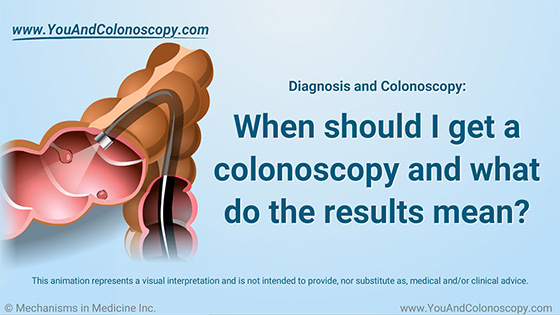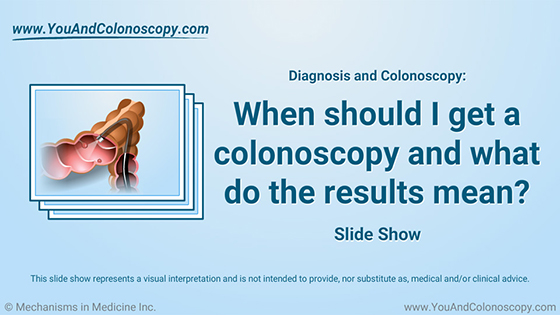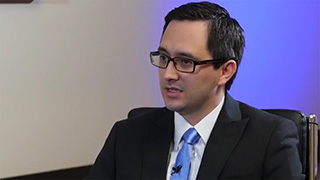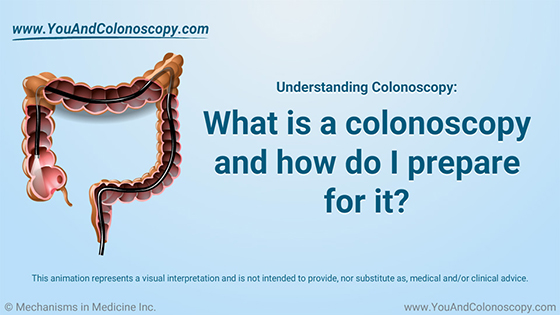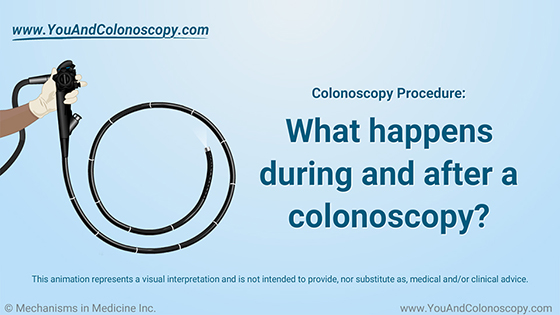*Please note: This slide show represents a visual interpretation and is not intended to provide, nor substitute as, medical and/or clinical advice.
A colonoscopy has two main purposes:
One purpose is to check on certain symptoms or conditions that your doctor would be concerned about.
The second purpose is to screen your colon for colorectal cancer.
A colonoscopy can be used to see problems in the colon in patients who have a variety of serious symptoms.
Some of these symptoms can include:
- chronic diarrhea or unexplained changes in your bowel habits;
- bleeding from your rectum or anus;
- unexpected weight loss;
- iron deficiency anemia;
- or other symptoms.
If you show signs of any of these symptoms you should talk to your doctor.
Colorectal cancer is one of the leading causes of death in the US. Colonoscopies have proven to significantly decrease the incidence of colorectal cancer.
If the lining of your colon contains polyps there is a chance that these small growths of tissue can turn into cancer.
A colonoscopy makes it very easy for your doctor to find and remove these polyps early on before they have a chance to become cancer.
During your colonoscopy, your doctor will be able to remove polyps easily using specialized tools.
These tools operate by cutting off polyps from the lining of the colon wall and removing them safely. Removal of polyps is painless since there are no nerves in the lining of the colon.
After a polyp is removed from your colon it is sent to a lab for analysis by a trained doctor, called a pathologist. The lab results are very important as they will inform you about whether the tissue sample is benign (i.e., not cancerous) or pre-cancerous. If the tissue sample is pre-cancerous you will need to meet with your doctor again.
There are two main categories of patient risk: "Average" risk and "Increased" risk. It is very important for you to understand which category of risk you belong to.
If you are a healthy male or female, age 50 or older, you are considered to be an average risk patient. In this category, it is recommended that you get a screening colonoscopy when you turn 50 since 90% of colon cancers occur after this age.
If the results from your previous colonoscopy return normal, your next one can be done in another 10 years. As long as no abnormal results are found along the way, the same schedule can be followed up until you are 75 years old.
A screening colonoscopy is the most useful test for the detection of colon cancer. However, your doctor may suggest a different test for you depending on your own medical circumstance.
These other tests can be divided into three groups: "stool based", "direct visualization", and "radiological".
Stool based tests include the guaiac-based fecal occult blood test (gFOBT), fecal immunochemical test (FIT), and stool DNA test.
Other test options include a flexible sigmoidoscopy, which is an example of a direct visualization test.
A computed tomographic colonoscopy is an example of a radiological test.
It is important to know that you will be asked to have a complete colonoscopy if any of these other tests are positive for cancer.
If you are in the group of patients considered to have an "increased" risk of colon cancer, it is suggested that you get a screening colonoscopy before you reach 50 years old.
If you are a patient who has an increased risk, you may need a colonoscopy more often than patients who are in the “average” risk group. Whichever group you belong to, a colonoscopy is a procedure that should be done several times over your lifetime because polyps can reappear.
Depending on the types of polyps found in your colon, some types have a higher chance of turning into cancer than others.
Hyperplastic polyps are a benign type of polyp which means that they have very little chance of turning into cancer. However, they still need to be removed and examined under the microscope, which will determine if these polyps are hyperplastic.
Even if you have hyperplastic polyps, it is still very important to have a colonoscopy every 10 years.
Unlike hyperplastic polyps, adenomas are a type of polyp that have the potential to become cancer.
If adenomas are found based on your colonoscopy results, you will be asked to have additional screenings done at shorter intervals of time, depending on the size and number of adenomas found.
If you have had colon cancer before, it is important to tell your doctor since you will have a higher risk of getting colon cancer again. After colon cancer treatment, your doctor may recommend that you get another colonoscopy.
Having a family history of colon cancer or adenoma-type polyps before you are 60 years old, means that you will need a colonoscopy sooner than the typical age.
You may also be asked to have a colonoscopy earlier than the average risk person if at least two first-degree relatives (i.e., parents, full-siblings, or children) or second-degree relatives (i.e., grandparents, grandchildren, uncles, aunts, nephews, or half-siblings) have had colon cancer at any age.
In these cases, screening may begin at 40 years of age, or as early as 10 years younger than when the family member was diagnosed, whichever happens first.
Certain conditions can lead you to have a higher risk of colorectal cancer. These can include Lynch syndrome, which is an inherited genetic condition that leads to an 80% risk of colon cancer over your lifetime.
Inflammatory bowel disease (IBD) involving the colon and primary sclerosing cholangitis (PSC) are other diseases that can increase your risk of colon cancer. If you have both IBD and PSC, you have about a 30-fold higher risk of developing colon cancer.
Colonoscopy is a powerful tool that your doctor can use to greatly reduce and prevent your risk of colon cancer. Talk to your doctor today about booking your colonoscopy.
